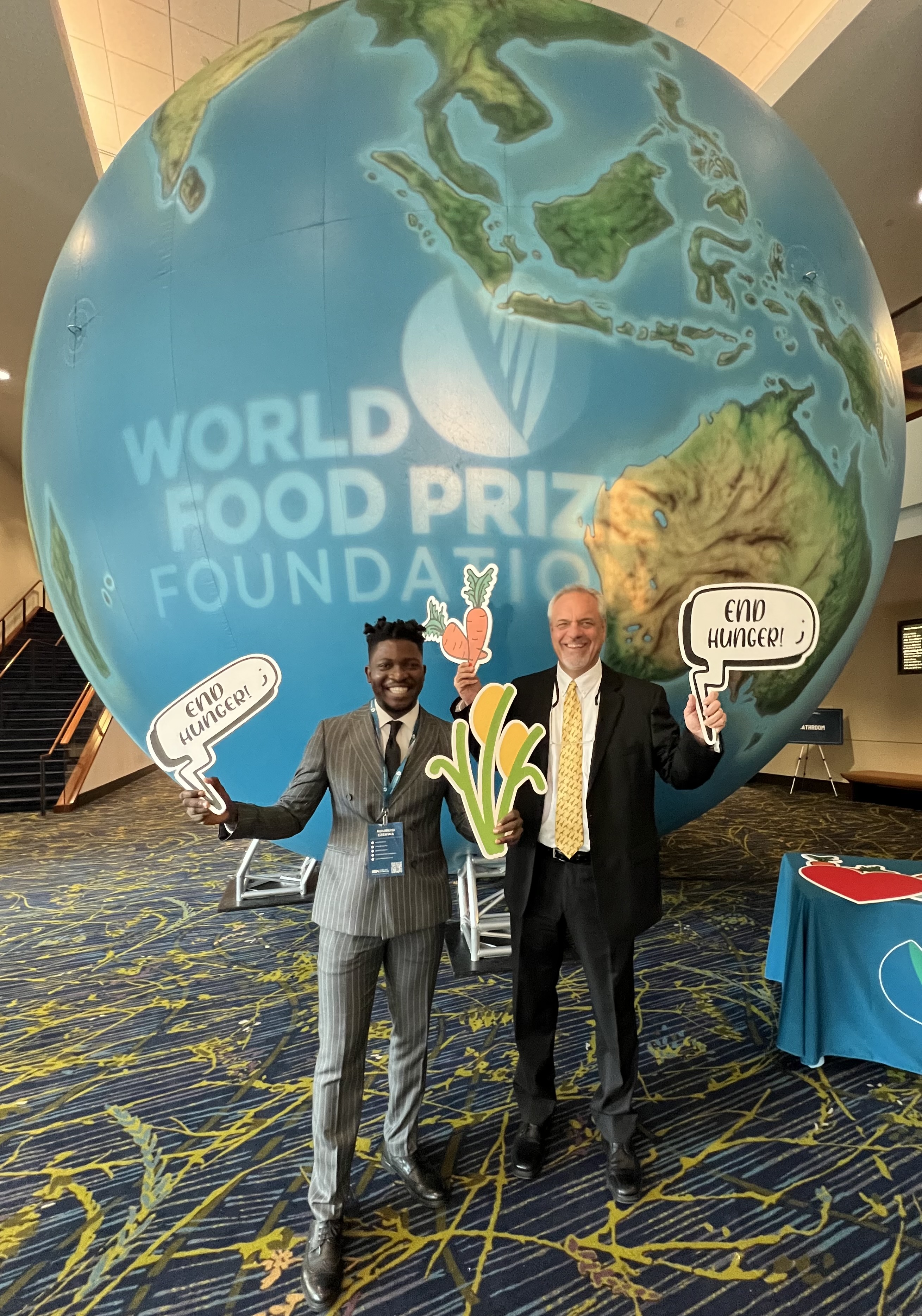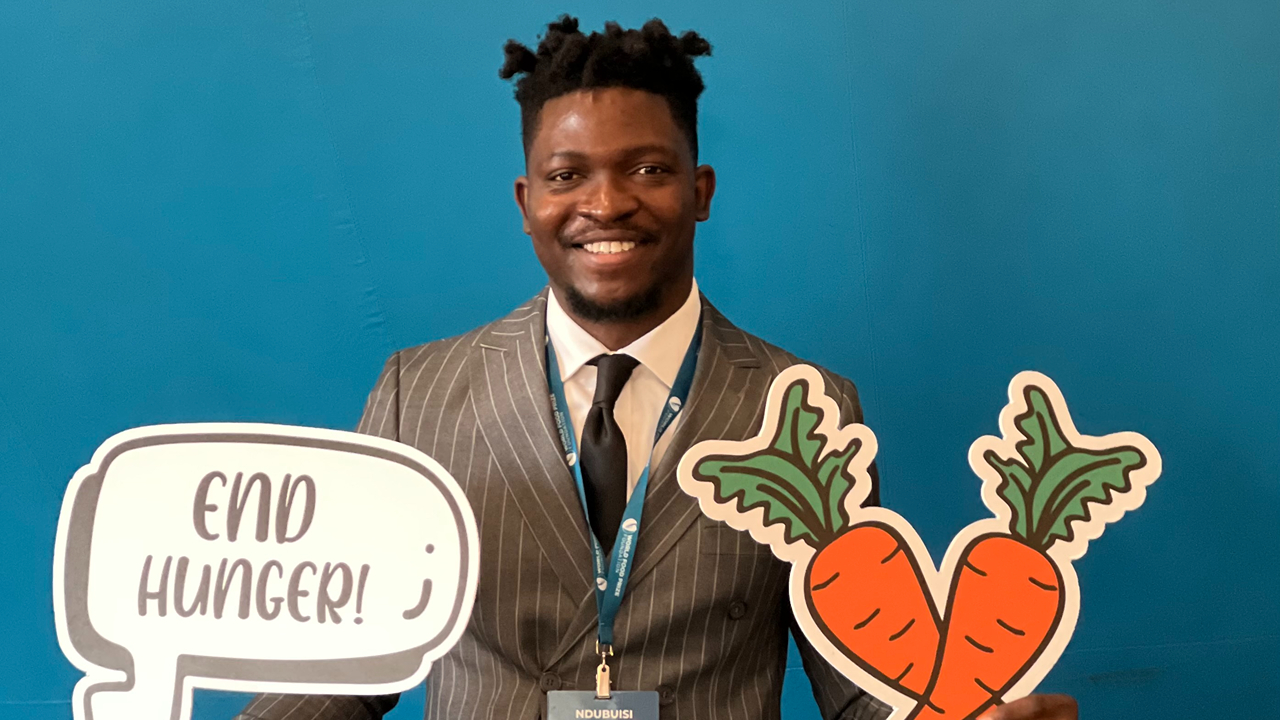content body
College of Human Sciences graduate student Ezenwa Ndubuisi recognizes the impact of poverty and food insecurity on a community.
“Growing up in an environment where economic hardship was almost a way of life, I saw firsthand how poverty and food insecurity affects communities, how it limits educational opportunities, how it affects health outcomes — especially in children — and how it generally restricts one’s potential,” he recounted.
His lived experiences opened his eyes to the extensive issues of poverty and food insecurity — both in his own country and globally. In addition, it fueled his desire to engage in the ongoing discussions about these issues and has reinforced his decision to pursue the Master of Development Practice (MDP) program in the College of Human Sciences at Auburn University.
“The MDP Program has equipped me to contribute to the discourse on the issues with both theoretical knowledge and practical skills essential for sustainable development solutions that address poverty and food insecurity,” said Ndubuisi. “Specifically, through coursework in Program Design and Evaluation, Applied Research and Quantitative Methods, I am able to analyze development challenges, assess the effectiveness of intervention and design evidence-based solutions to sort through challenges that can make a real-world impact.”
“The MDP Program has equipped me to contribute to the discourse on the issues with both theoretical knowledge and practical skills essential for sustainable development solutions that address poverty and food insecurity.”
An example of this real-world application is Ndubuisi’s participation in the current Global MDP Challenge, where he and his team designed a program to address Sustainable Development Goal that builds resilience among the poor and vulnerable by reducing their exposure to climate-related disasters and other economic, social and environmental shocks.
For this challenge, their focus was on Malaysia’s Sabah region, which is severely impacted by flood-induced poverty and deprivation. This project allowed him to apply his in-class learning experiences to create solutions that empower communities to withstand and recover from climate-induced poverty and deprivation.
“The combination of academic rigor, coupled with practical applications, equips me with the skills needed to contribute meaningfully to the discourse that addresses the needs of underserved communities globally,” said Ndubuisi. “With a focus on hunger, poverty, global market changes, humanitarian aid, social policy and more, Auburn University’s MDP is the first of its kind to bring a human science and quality of life perspective to the field.”
Ndubuisi and his team included Auburn MDP student Cecilia Kankam Kusi and three other teammates from Universiti Sains Malaysia, University of Botswana and Universite Cheikh Anta Diop in Senegal as they won the international competition and were globally recognized for their work.
“Do you want to make an impact? Earning a Master of Development Practice means you will,” said Ndubuisi. “Auburn’s MDP program will train you to think differently to create sustainable solutions to the major issues of our world. You’ll take engaging classes such as program design and social policy that will provide a practical and holistic approach to developing strategies with a global perspective.”

College of Human Sciences graduate student Ezenwa Ndubuisi, left, and Roger Thurow, renowned author and guest lecturer.
During his Master of Development Practice study abroad trip to Ireland, Ndubuisi had the opportunity to visit the Technological University, Dublin, where he interacted with faculty members and learned about the existing programs Ireland has in place to address human development. During this trip, he also had the occasion to explore and appreciate the Irish culture, which gave him a glimpse into the role tourism plays in promoting sustainable economic development.
Roger Thurow, renowned author and guest lecturer, introduced Ndubuisi to the Farm Journal Foundation, an organization dedicated to advocating for sustainable agricultural practices and policies that combat food insecurity.
“Mr. Thurow’s work on global hunger and sustainable agriculture deeply resonates with me and his passionate advocacy for food security and poverty alleviation also inspires me to get involved,” said Ndubuisi.
Through his involvement as a student fellow with the Farm Journal Foundation, Ndubuisi had the opportunity to participate in the recent World Food Prize and Borlaug Dialogue in Des Moines, Iowa. The Borlaug Dialogue is a three-day symposium that brings together international experts, policy leaders, business executives and farmers to address cutting-edge issues in global food security and nutrition. The event regularly attracts more than 1,000 participants from more than 50 countries and has been referred to as "the premier conference in the world on global agriculture."
“The conference was inspiring and insightful and the environment was filled with experts, students, organizational leaders and policy makers who are committed to tackling food security, poverty and agricultural challenges across the world,” said Ndubuisi.
The atmosphere encouraged open dialogue and networking and some of the ideas that stood out to him and which he sees as driving solutions were Crop Breeding and Seed Preservation (seed vaults and botanical gardens), Climate Adaptation and Resilience (the future of food security in a changing climate), and Climate Finance (empowering small nations to combat drought and climate challenges) and further described them as solutions “empowering vulnerable communities to build sustainable, climate-resilient livelihoods and ensure long-term food security.”

Ndubuisi, left, with President of the African Development Banks (AfDB), Akinwumi Adesina.
An unexpected bonus for Ndubuisi at the conference was a personal invitation extended to him by one of his professional role models and motivators — President of the African Development Banks (AfDB), Akinwumi Adesina. President Adesina commended Ndubuisi on his “passion for the field” and stressed that “no challenge is more critical than addressing the fundamental issues of food and poverty, which are at the core of human survival, and the advancement of global well-being.” He also extended an invitation to Ndubuisi to be a fellow of the forthcoming cohort of the World Hunger Fighters initiative, which Ndubuisi says is “an incredible opportunity to contribute to the global effort in addressing food insecurity.”
In addition, Ndubuisi recently had the opportunity to collaborate with fellow authors on research such as "Catalysts of Economic Welfare in Africa: A Cross-sectional Autoregressive Distributed Lag (CS-ARDL) Model" and "Renewable Energy and Inclusive Economic Development: An African Case Study" as both articles have been published in peer-reviewed journals.
“These papers explore important aspects of economic welfare — human development — and the role of renewable energy such as eco-friendly energy systems in promoting inclusive growth in Africa,” said Ndubuisi. “I remain focused on continuing to work with others to expand this impact and find solutions that make a meaningful difference.”
Not long ago, Ndubuisi interned with the Walker Area Community Foundation (WACF) through the Regional Planning Commission of Greater Birmingham (RPCGB), where he worked with the team to develop Walker County’s economic development plan in support of regional development initiatives in Walker County, Alabama which he described as “a great honor.” He is continuing this work throughout the duration of his MDP program and is excited to bring is expertise to help communities in rural Alabama. He also belongs to the following professional organizations: International Society of Sustainability Professionals, Student Advisory and Alumni Council of the Global MDP Association, World Economics Association and Nigerian Economics Society.
Ndubuisi emphasized that the World Bank and the United Nations forecast that by 2030, more than 575 million people will be living in extreme poverty, surviving on less than $2.15 per day, and more than 600 million people will experience food insecurity.
“This essentially justifies the urgency of these problems, requiring a concerted effort from relevant stakeholders,” said Ndubuisi. “My hope is to contribute to sustainable development by designing and implementing evidence-based solutions that address poverty and food security. Poverty and food insecurity – problems often attributed to medieval times – are undoubtedly two of the most urgent issues we face in the 21st century, affecting millions of people globally. These twin problems are intertwined, and limit access to nutritious food and opportunities for livelihoods, especially in underserved communities.”
Learn more about Auburn’s MDP Program:
Master of Development PracticeLearn about the new accelerated BS/MDP Curriculum option
Global Studies — ABM




